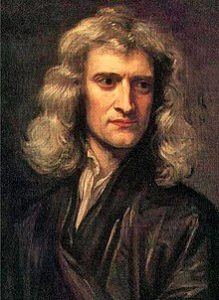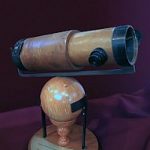 Most of us think of Isaac Newton for things like Newtonian mechanics, Universal gravitation, Calculus, Newton’s laws of motion, Optics, Binomial series, Principa, and Newton’s method…ok, maybe not, I doubt if most of us know what most of that means, but we knew that he was a great mathematician. Newton was an English mathematician, but he was also a physicist, astronomer, theologian, and author who is widely recognized as one of the most influential scientists of all time, and a key figure in the scientific revolution.
Most of us think of Isaac Newton for things like Newtonian mechanics, Universal gravitation, Calculus, Newton’s laws of motion, Optics, Binomial series, Principa, and Newton’s method…ok, maybe not, I doubt if most of us know what most of that means, but we knew that he was a great mathematician. Newton was an English mathematician, but he was also a physicist, astronomer, theologian, and author who is widely recognized as one of the most influential scientists of all time, and a key figure in the scientific revolution.
Politically and personally, Newton was tied to the Whig party, an early version of the Republican Party. He served two brief terms as Member of Parliament for the University of Cambridge, in 1689-1690 and 1701-1702. He was noted by Cambridge diarist Abraham de la Pryme to have rebuked students who were frightening locals by claiming that a house was haunted. Newton moved to London to take up the post of warden of the Royal Mint in 1696, a position that he had obtained through the patronage of Charles Montagu, 1st Earl of Halifax, then Chancellor of the Exchequer. He took charge of England’s great recoining, trodden on the toes of Lord Lucas, Governor of the Tower, and secured the job of deputy comptroller of the temporary Chester branch for Edmond Halley. Newton became perhaps the best-known Master of the Mint upon the death of Thomas Neale in 1699. It was a position Newton held for the last 30  years of his life, and one of which he was very proud. These appointments were intended as type of figurehead position, but Newton took his job seriously. He retired from his Cambridge duties in 1701, and exercised his authority to reform the currency and punish clippers and counterfeiters. As Warden, and afterwards as Master, of the Royal Mint, Newton estimated that 20% of the coins taken in during the Great Recoinage of 1696 were counterfeit. Counterfeiting was high treason, which was punishable by the felon being hanged, drawn, and quartered. Despite that, it would be very difficult to convict even the most flagrant criminals. Nevertheless, Isaac Newton proved to be equal to the task.
years of his life, and one of which he was very proud. These appointments were intended as type of figurehead position, but Newton took his job seriously. He retired from his Cambridge duties in 1701, and exercised his authority to reform the currency and punish clippers and counterfeiters. As Warden, and afterwards as Master, of the Royal Mint, Newton estimated that 20% of the coins taken in during the Great Recoinage of 1696 were counterfeit. Counterfeiting was high treason, which was punishable by the felon being hanged, drawn, and quartered. Despite that, it would be very difficult to convict even the most flagrant criminals. Nevertheless, Isaac Newton proved to be equal to the task.
Disguised as a frequent patron of bars and taverns, he gathered much of that evidence himself. For all the barriers placed to prosecution, and separating the branches of government, English law still had ancient and formidable customs of authority. Newton had been made a justice of the peace in all the home counties. A draft letter regarding the matter is included in Newton’s personal first edition of Philosophiæ Naturalis Principia Mathematica, which he must have been amending at the time. Then he conducted more than 100 cross- examinations of witnesses, informers, and suspects between June 1698 and Christmas 1699. Newton successfully prosecuted 28 coiners. In April 1705, Queen Anne knighted Newton during a royal visit to Trinity College, Cambridge. The knighthood is likely to have been motivated by political considerations connected with the Parliamentary election in May 1705, rather than any recognition of Newton’s scientific work or services as Master of the Mint. Newton was the second scientist to be knighted, after Sir Francis Bacon. Newton died in his sleep in London on 20 March 1727. His body was buried in Westminster Abbey. A bachelor all his life, Newton had distributed much of his estate to relatives during his last years, and in the end, he died intestate. That seems, to me, a sad ending to an extraordinary life.
examinations of witnesses, informers, and suspects between June 1698 and Christmas 1699. Newton successfully prosecuted 28 coiners. In April 1705, Queen Anne knighted Newton during a royal visit to Trinity College, Cambridge. The knighthood is likely to have been motivated by political considerations connected with the Parliamentary election in May 1705, rather than any recognition of Newton’s scientific work or services as Master of the Mint. Newton was the second scientist to be knighted, after Sir Francis Bacon. Newton died in his sleep in London on 20 March 1727. His body was buried in Westminster Abbey. A bachelor all his life, Newton had distributed much of his estate to relatives during his last years, and in the end, he died intestate. That seems, to me, a sad ending to an extraordinary life.


2 Responses to An Extraordinary Life